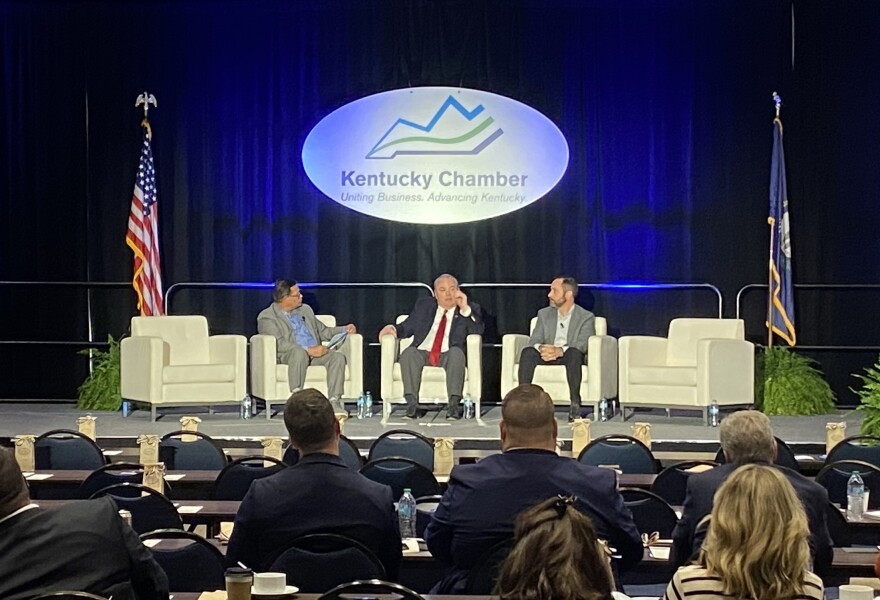While vowing the Republican supermajority’s goal is to reduce the Kentucky income tax to zero, Rep. Jason Nemes, the majority whip from Middletown, said he believes the state met the necessary budget threshold this past summer to trigger another half-percent decrease in income tax.
That’s even though the state budget director made it clear in August that the state’s revenues fell $7.5 million short of what was needed in the last fiscal year to trigger another such cut, based on the complicated tax cut mechanism the supermajority created in 2022.
“I do not accept that we didn't hit the triggers,” Nemes said at the Kentucky Chamber of Commerce Legislative Preview. “I think we did hit the triggers in Kentucky, and even if we didn't — but we did that — we should, we need to reduce the taxes anyway.”
Nemes noted that, due to severe storms and widespread flooding, Gov. Andy Beshear extended the state tax deadline for the entire state until Nov. 3. The tax cut mechanism calls on the state budget director to report based on the revenues, reserves and spending for the previous fiscal year, which ended June 30.
Thanks to a cut passed by the General Assembly, and signed by Beshear, earlier this year, the income tax rate will decrease to 3.5% in January. Legislative staff estimated the cut would cost the state $718 million in annual revenue moving forward.
Republican Sen. Chris McDaniel from Ryland Heights chairs the Senate’s Appropriations committee and shared the stage with Nemes. He appeared less willing to shift the calculation on the income tax trigger for next year and said the state did miss that trigger based on the current system.
“Ultimately, we had a particular process in place, and under the process that was in place, which involves the [Office of the State Budget Director] certification at the end of the year, we were off by about $7 million,” McDaniel said.
The 2022 mechanism is designed to incrementally lower Kentucky’s individual income tax rate until it hits zero — a goal Nemes insisted is still a top priority. The rate is lowered so long as the state budget reserve trust fund is at least 10% of General Fund revenue at the end of a fiscal year, and such revenue would have exceeded General Fund spending even if the tax rate had been a full percentage point lower.
But Republicans have expressed some frustration that the process doesn’t move speedily enough or fear it will become harder to hit in future years. The state already missed the threshold in the 2023 fiscal year by $435 million.
In the 2024 legislative session, lawmakers exempted the entirety of a $2.5 billion “one-time” appropriations bill from counting toward the expenditure part of the tax cut formula, not including the pension funding elements that were already excluded from counting against the trigger mechanism.
Then, this year, lawmakers changed the formula, allowing incremental cuts if the full half-percent threshold wasn’t met. For example, under that change, a quarter-percent cut would have been triggered, but that new threshold doesn’t go into place until the next fiscal year.
McDaniel told Kentucky Public Radio at the time that he didn’t foresee tinkering with the trigger mechanism in the coming legislative session.
However, GOP House Speaker David Osborne of Prospect, in response to a question about the failure to hit the trigger this year, said, “We can make policy however we want to make it, so it doesn't really ultimately matter.”
Regardless of discussions within the GOP caucus of whether to cut the income tax again next year, which would mean dropping to 3% in 2027, Nemes said it’s only a matter of time.
“We're on a collision course to 0%. That's going to happen. The only variable is time, but we're going to get there,” Nemes said at the Kentucky Chamber event. “I don't accept that we didn't hit the trigger. The trigger was measured too early.”
The Kentucky Chamber has long supported “phasing out” the state income tax and strongly supported the original 2022 mechanism. Republican lawmakers frequently attribute Kentucky’s economic growth in recent years to their tax cuts and budget restraint.
McDaniel said Monday his goal is to continue on that path, especially in terms of "budgeting discipline."
“You don't want exciting. If finance gets too exciting, if finance makes above-the-fold headlines, we have a problem,” McDaniel said. “You want finance to not be the tail that's wagging the dog, and we've lived that life in the General Assembly as recently as 10 years ago.”
The 2026 legislative session, when lawmakers will craft the budget for the next two years, begins in January. Republicans overwhelmingly control both chambers. Crafting this year’s budget may prove trickier than it been the last several years due to economic uncertainty, declines in federal funding and a projected $300 million shortfall in state general revenues.





